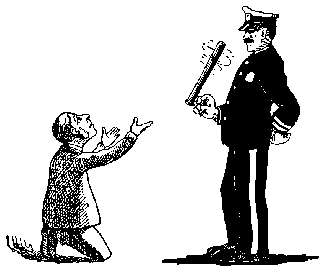

Police officers are facing more and more lawsuits for malicious prosecution. Whenever criminal charges are dismissed, or whenever there is a verdict in favor of the accused, there is a possibility that the charging officer will be sued. Malicious prosecution exists when a prior proceeding was maliciously commenced against the plaintiff by the defendant-officer, for which there was no probable cause, and the prior proceeding was terminated in the plaintiff's favor. In order to establish malicious prosecution, the accused must show that:
The termination of proceedings in favor of the plaintiff is usually easy to prove. Any time there is an acquittal, a dismissal of the charges, or a discharge from arrest, the proceedings have been terminated in favor of the plaintiff. The other elements, malice and lack of probable cause, require more analysis.
Malice commonly means ill will and hatred. However, the law recognizes two separate classifications of malice. "Actual" or express malice is characterized by hatred or ill will. "Legal" or implied malice, on the other hand, refers to the state of mind under which a person does a wrongful act purposely, without a reasonable or lawful excuse. Since the malice required for malicious prosecution may be either express or implied, it is not necessary to show that the officer brought or continued the criminal prosecution through vindictiveness or spite. The accused need only show that the criminal action was begun or continued, intentionally and wrongfully, with a bad motive or for an improper purpose.
The following questions are important in determining the existence of malice:
Along with malice, a lack of probable cause is essential to an action for malicious prosecution. Even if a criminal prosecution fails, an officer cannot be held liable for damages arising from the arrest and prosecution of the accused so long as the officer acted in good faith and upon probable cause. A finding of probable cause by a judge, magistrate or grand jury is one of the police officer's strongest defenses. Such a ruling creates a rebuttable presumption that probable cause did exist.
In order for an officer to protect against a potential action for malicious prosecution, it is important to document not only the proof of guilt, but also any exculpatory evidence. Probable cause requires an officer to be cautious. A cautious officer will present to the grand jury or the magistrate all the evidence, both for and against prosecution. If the magistrate or grand jury finds probable cause, the officer then has the best weapon against a lawsuit for malicious prosecution.
Finally, the statute of limitations does provide for one saving grace; an action for malicious prosecution must be brought within one year. However, malicious prosecution claims generally require that the original proceedings have terminated in favor of the accused, so the basis for a lawsuit will occur only after the prosecution ends, and the statute of limitations runs only from that time.